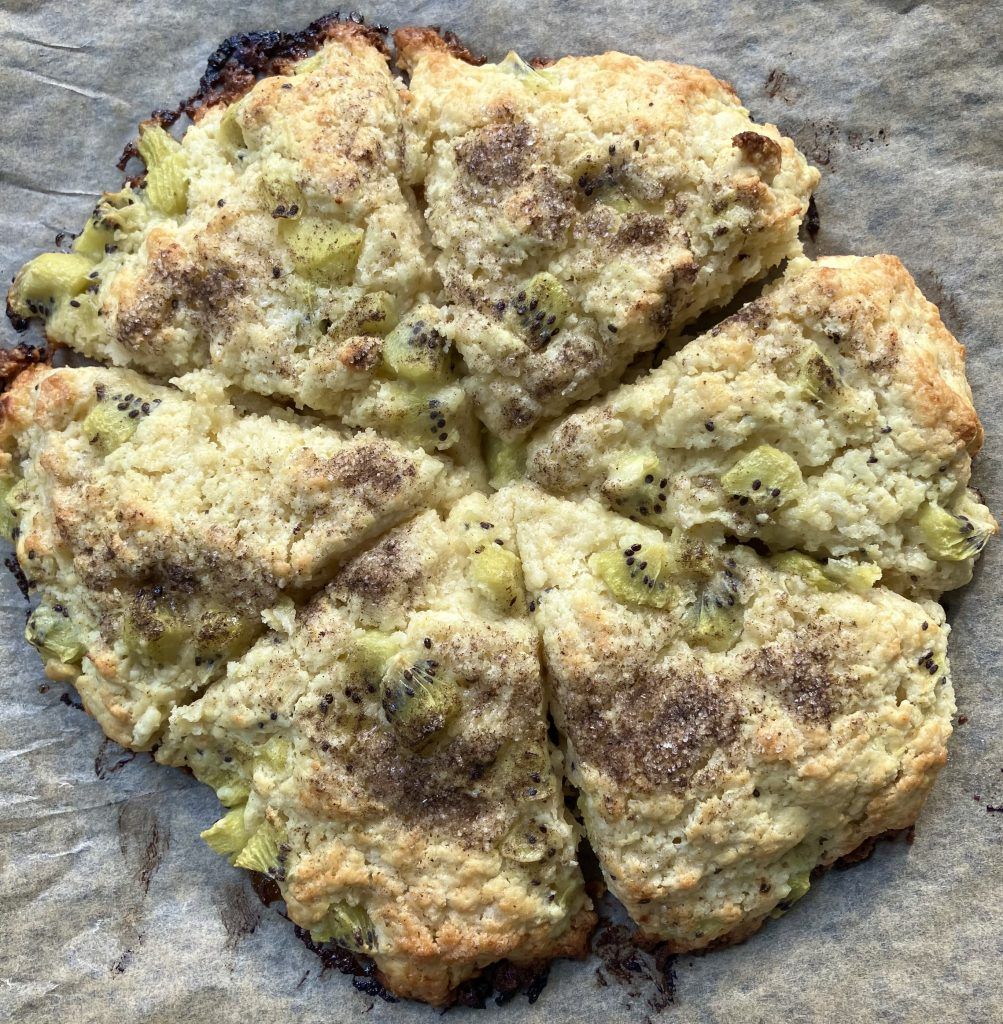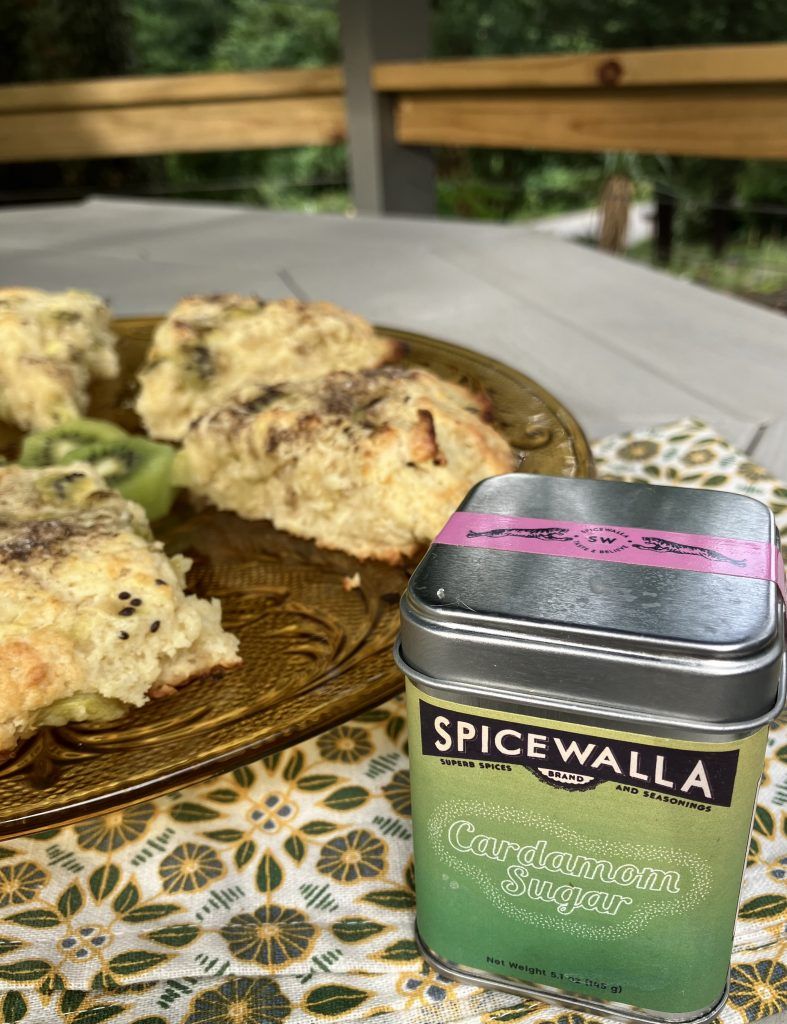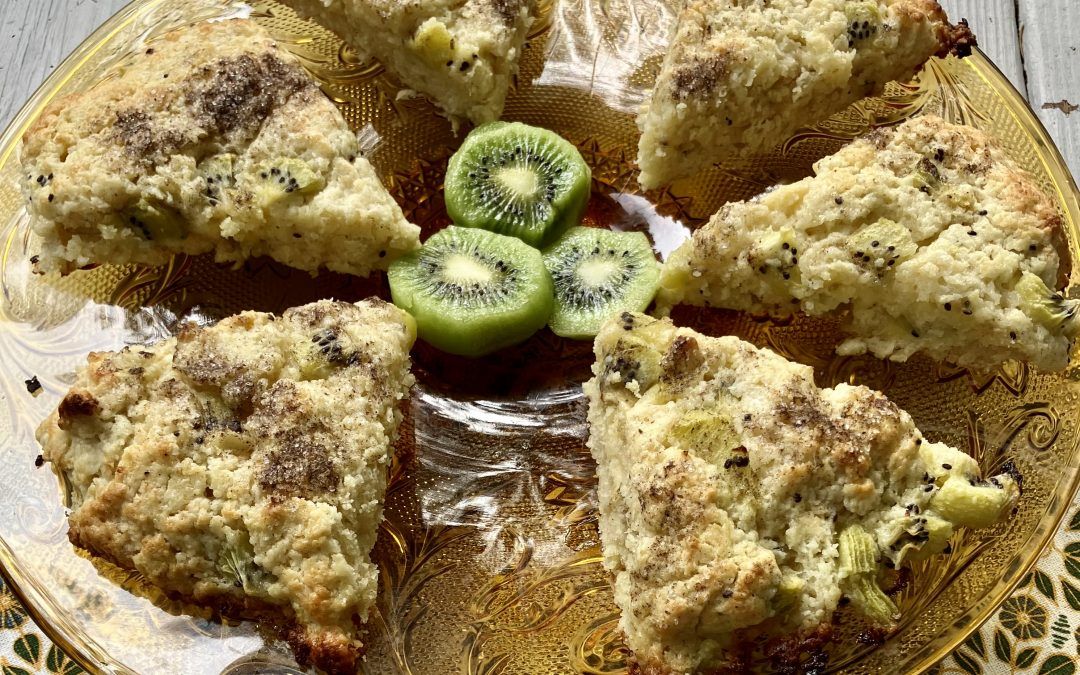Managing IBS Symptoms Naturally
Let’s talk about how kiwi helps constipation! If you would have told me that I would be posting about constipation on my blog a few years ago, I might had said “No way”!
However, we all know that not being able to “go” is a fact of life sometimes. And in the area of digestive discomforts, irritable bowel syndrome (IBS) with constipation is one of the most difficult things to have.
Nature offers a delicious solution with kiwis. Bursting with fiber and digestive enzymes, kiwis are here to rescue your gut health!
In this blog post, we’ll look at why kiwis can help for constipation relief, and in addition, I’ll share some valuable tips to ease your burden from IBS and or constipation. And to make things even better, I have a delightful recipe for kiwi scones that’ll have your taste buds singing with joy!
Before we talk about how kiwis can help, let’s talk a little bit more about constipation and IBS.
Understanding Constipation and IBS
IBS affects at least 10-15 % of people in the United States. Irritable Bowel Syndrome – StatPearls – NCBI Bookshelf (nih.gov)
IBS-C (which is the constipation variety) is estimated to affect about 1/3 of people with IBS. Diagnosis and treatment of irritable bowel syndrome with predominant c | IJGM (dovepress.com)
In addition, IBS-C may also be more resistant to treatment than other sub-types. But if you have it, there are things that you can try so you feel less discomfort. There is more help than even with lifestyle interventions and medical treatments.
Constipation is a common digestive discomfort, which can be especially painful for people suffering from IBS. Symptoms. Symptoms include infrequent bowel movements, difficulty passing stools, and a sense of incomplete emptying of the bowels.
People can also have constipation and not have IBS. This type of constipation is called idiopathic constipation. About 14 % of people in the United States have this type of constipation and a large proportion of people are women (about 21% of women may have it).
And as we get older, it is more likely to have it. This may be due to inactivity, hydration, diet, medications, certain supplements and even a change in hormone levels.
Chronic idiopathic constipation in adults: epidemiology, pathophysiology, diagnosis and clinical management – PubMed (nih.gov)
Epidemiology and burden of chronic constipation – PMC (nih.gov)
Menopause Constipation: Connection, Treatment, and More (healthline.com)
IBS, in comparison, is a chronic health condition that affects the large intestine and often leads to abdominal pain, bloating, and altered bathroom habits. And idiopathic constipation usually does not come with pain and the symptoms may not be as severe.
IBS with constipation is often referred to as functional constipation which means that they are unidentifiable in diagnostic tests.
The combination of both constipation and IBS can significantly impair one’s quality of life, but there’s hope for treating the symptoms with lifestyle changes! I want to share some of these with you!
Soothing Tips for Living with IBS
Here are a few natural remedy tips for managing IBS and constipation:
While kiwis offer relief for constipation, managing IBS requires a holistic approach. Here are some additional lifestyle tips to help ease IBS symptoms and promote overall digestive wellness:
- Mindful Eating: Slow down and savor your meals, chewing food thoroughly to aid digestion.
- Fiber-Rich Diet: Incorporate high-fiber foods like fruits, vegetables, whole grains, and legumes into your daily meals.
- Hydration: Stay hydrated by drinking plenty of water throughout the day, as adequate hydration is essential for optimal bowel function.
- Stress Management: Practice stress-reducing techniques such as deep breathing, meditation, gut focused hypnotherapy, or yoga to alleviate IBS-related anxiety and tension.
- Exercise can also help manage constipation.
- The low fodmap diet may help about 80% of people suffering from IBS. People have the most success working with a MONASH Trained Dietitian. You can find a list of dietitians specializing in this at the end of the post.
Can Fiber Increase My Constipation?
There are a number of people who do not benefit from increasing fiber to help alleviate constipation. That is because there are additional reasons that someone suffers from constipation besides not eating enough fiber.
There are several alternative remedies that can help depending on the cause. A physician evaluation may need to be done to determine if you have one of these conditions. There are several tests that may be done.
-Abdomino-phrenic Dyssynergia: This is a muscle coordination issue that may be helped by a physical therapist specializing in the pelvic floor area and some people may even benefit from a squatty potty.
-gastroparesis: Is a neurological condition that can cause gut sluggishness. And this can cause a delay in the digestive process where there can be a back- up which can lead to constipation.
In addition to lifestyle intervention, a physician may have other possible treatments.
Constipation can be a serious problem if someone is “full of stool” for extended periods of time and in some serious cases, it may need to be physically removed with surgery. Physicians may prescribe over the counter or prescriptions to help.
How Much Fiber Do We Need Each Day?
Let’s talk amount needed for men and women to eat daily for good health. Men need an average of 35 grams per day and women 28 grams.
There are other important things to remember when adding fiber, like drinking plenty of water and adding fiber a little bit at a time so someone does not get bad gas, or the constipation worsens.
Types of Fiber in the Diet
Including the right combinations of your fiber can benefit constipation and possibly other health issues. Here is a little more about the types of fiber.
- Soluble: This fiber dissolves in water and makes a gel like material.
- Insoluble: This fiber does not dissolve but instead absorbs substances and forms our “stool”.
Difference Between Soluble & Insoluble Fiber (clevelandclinic.org)
Fiber can be further categorized into fermentable and non-fermentable. Let’s explore a little more about it:
- fermentable: This type of fiber can be used as fuel for healthy gut bacteria which helps promote a healthy gut. However, this fermentation sometimes may cause gut discomfort and gas especially if someone has IBS.
- non-fermentable: Does not feed healthy gut bacteria in gut so it just passes right through without the symptoms.

The Power of Food: Kiwi Helps Constipation
Let’s talk about the humble kiwi, a vibrant green fruit packed with nutritional goodness. Kiwis are a rich source of dietary fiber, including both soluble and insoluble fibers, which plays a crucial role in promoting regularity and softening stool consistency. The fiber is kiwi is also the non-fermentable type of fiber which means that it won’t ferment in you colon causing bloating and pain.
Moreover, kiwis contain an enzyme called actinidin, known for its ability to enhance digestion by breaking down proteins. This dynamic duo of fiber and enzymes makes kiwis a potent weapon against constipation.
Other nutrition benefits of kiwi include being rich in vitamin C, potassium as well as several important plant nutrients:
How many kiwi fruit for constipation relief?
According to research the number of kiwis needed per day is two a day to help provide relief from constipation. Here is the research on the benefits of using kiwi for constipation relief in both people with ideopathic and functional IBS-C constipation.
Kiwi fruit for constipation – A blog by Monash FODMAP | The experts in diet for IBS – Monash Fodmap
One way to get some of this healthy fruit is by making these tasty Low Fodmap Kiwi Scones.
Low Fodmap Kiwi Scones Recipe.

Low Fodmap Kiwi Scones
Now, let’s indulge in the comforting warmth of freshly baked kiwi scones. They are simple to make and full of lots of beneficial nutrients like fiber, vitamin C and potassium. Cardamon is an exotic tasting spice that I love in baked goods. This spice also has health benefits with one of those being benefits to digestion! 10 Health Benefits of Cardamom, Backed by Science (healthline.com) I also used gluten-free flour because some people with IBS are intolerant to fructans which are found in wheat. Below is how to whip up this irresistible kiwi scone recipe!
2 cups gluten-free flour (I used King Arthur flour Gluten-Free Baking | King Arthur Baking)
1/4 cup granulated sugar
1 tablespoon baking powder
1/2 teaspoon salt
1/2 cup Earth Balance margarine
2 ripe kiwis, peeled and diced
1/2 cup milk
1 teaspoon vanilla extract
Cardamon sugar (Make your own-see below or try Spicewalla Brand)
Preheat your oven to 425°F and line a baking sheet with parchment paper.
In a large mixing bowl, mix the gluten free flour, sugar, baking powder, and salt.
Add the Earth Balance margarine to the flour mixture and use a pastry cutter or fork to cut the butter into the flour until the
mixture resembles coarse crumbs.
In another small bowl, whisk together the milk and vanilla extract. Gradually add the milk mixture into the flour mixture, stirring until a soft dough forms. Add diced kiwis and gently fold until evenly distributed.
Turn the dough out onto a lightly floured surface and lightly knead it a few times until it comes together. Pat the dough into a circle about 1 inch thick, then use a sharp knife to cut it into 6-8 wedges.
Place the scones onto the prepared baking sheet with parchment, leaving space between each scone. Sprinkle the top of them with cardamon sugar.
Bake in the preheated oven for 15-18 minutes, or until the scones are golden brown on top. Allow the scones to cool slightly before serving.
(To make your own cardamon sugar: Mix 1/4 teaspoon of cardamon with 1/3 cup sugar. Double it if want more for later.)
Eat Some Kiwi for Constipation
In conclusion, it is great to know that kiwis with their fiber-rich goodness and digestive enzymes are a natural ally in the fight against constipation and IBS. They are also beneficial to your health in other ways.
By incorporating kiwis into your diet and following these helpful tips, you may be able to soothe digestive discomfort and will be successful to reach greater gut health!
And when the cravings strike, whip up a batch of kiwi scones for a delightful treat that nourishes both body and soul. Here’s to happy, healthy digestion!
If you need additional assistance working with a dietitian who specializes in working with clients with IBS, look for one on FODMAP Dietitians Directory – Monash Fodmap . I happen to be on the list also and have 13 years working with people with IBS. We have gone through an additional 6-month training and passed an international exam to provide the best care for our clients.
I would love to hear from you if you would like to share your experience managing your IBS or share your favorite tips to soothe IBS symptoms. Also, let me know if you made the scone recipe!



